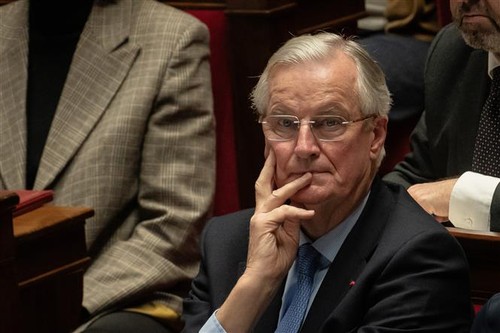 Prime Minister Michel Barnier (Photo: XNA/VNA) Prime Minister Michel Barnier (Photo: XNA/VNA) |
A vote of no confidence by both right- and left-wing lawmakers forced Prime Minister Barnier to resign after just three months in office. He is the second French Prime Minister to resign this yearafter Gabriel Attal.
Growing pressure on President Macron
331 of 577 lawmakers voted against Barnier’s government, making it the first French government to lose a no-confidence vote since 1962, and making Barnier France’s shortest-serving Prime Minister in history.
France is now hurtling toward the end of a remarkably volatile year without a Prime Minister or a budget. Macron is obliged to pick a new Prime Minister, but it’s difficult to envisage a candidate who can expect the support of both the left and the far right. And a new budget must be passed before the December 21 deadline.
Macron is halfway through his second and final term as President. A recent snap legislative election had the effect of weakening his power at home and abroad.
There are growing calls for his resignation, but in a televised speech on Thursday, Macron said he will serve out the remainder of his term.
“The mandate that you have democratically entrusted to me is a five-year mandate, and I will exercise it fully until its end. I’m responsible for ensuring the continuity of the State, the proper functioning of institutions, and the protection of the French people,” said Macron.
The French Constitution does not require the President to resign after the government he appointed falls. And France can’t hold early elections immediately because the current parliament must serve until June, 2025, exactly one year after the last election.
Political and economic consequences
The French government’s collapse will have a serious political and economic impact in the EU because of France's key position in the bloc, especially on important issues like the climate, security, the economy, and trade.
Germany fell into a similar situation when the coalition government of Chancellor Olaf Scholz reached the brink of dissolution, forcing him to call an extraordinary general election in early 2025.
The internal affairs of Germany and France will cause challenges for the EU, which already has its hands full dealing with the conflict in Ukraine and the return to power of Donald Trump.
Economic instability in France will spread to other eurozone countries. The euro has lost 0.5% of its value against the US dollar since the no-confidence vote and will continue to feel downward pressure. The Eurozone financial market can expect to see international investors turning to safer markets, such as the US.